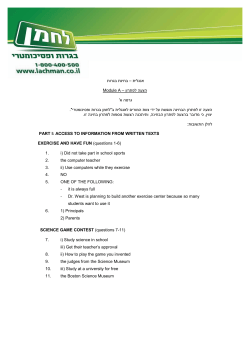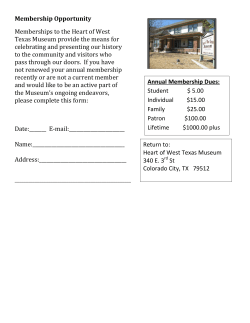
International Perspectives of Adult Education in Museums
1 2 4th NATIONAL CONFERENCE ON MUSEUMS AND ADULT EDUCATION 13 May 2015, Pécs, Hungary Program 9:00-10:00: Registration 10:00-12:00: Hungarian language plenary session Location: PTE FEEK, Aula 10:00-12:00: English language workshop for students Hochschule Zittau/Görlitz University of Szeged, Faculty of Humanities University of Pécs, Faculty of Adult Education and HRD Chair: PROF. DR. PHIL. DR. HABIL PROF. H.C. MATTHIAS THEODOR VOGT Location: PTE FEEK, FSZ/A room 12:00-13:30: Lunch Location: PTE FEEK, Nagyterem 13:30-15:30: English language session- International Perspectives of Adult Education in Museums Location: FSZ/A room 15:30-15:50: Coffee break Location: PTE FEEK, hallway in front of the Nagyterem 16:00: Bus transfer to the Modern Art Gallery, Janus Pannonius Museum Location: 7621 Pécs, Papnövelde u. 5. 16:30-17:15: English language guided tour in the Modern Art Gallery for international participants of the conference Guide: GÁBOR TILLAI, cultural manager, Janus Pannonius Museum Location of the conference: University of Pécs, Faculty of Adult Education and Human Resources Development 7633 Pécs, Szántó Kovács János utca 1/B. 3 Session #7: English language session - International Perspectives of Adult Education in Museums Location: PTE FEEK, FSZ /A room Chair: ANIKÓ MISZNÉ KORENCHY, museum educator, Hungarian Museum of Trade and Tourism 13:30-13:45: PROF. DR. PHIL. DR. HABIL. PROF. H.C. MATTHIAS THEODOR VOGT, Chair of Cultural Policies, Hochschule Zittau/Görlitz, Germany; director, Institut für kulturelle Infrastruktur Sachsen WHY OLD-FASHIONED MUSEUMS DO NOT FOSTER REGIONAL IDENTITY AMONG YOUNGSTERS. WHO NEEDS MUSEUMS WHICH DO NOT SPEAK TO YOUNG PEOPLE? WOULDN’T IT BE BETTER TO ABOLISH THEM? SOME SIGNIFICANT EXAMPLES AND A SUGGESTION. 13:45-14:00: DR. TERÉZ KLEISZ, associate professor, University of Pécs, Faculty of Adult Education and Human Resources Development UNDERSTANDING NON-PARTICIPATION IN MUSEUMS. WHAT WORKS FOR YOUNG ADULTS? 14:00-14:15: DR. IVÁN ZÁDORI, vice-dean, assistant professor, University of Pécs, Faculty of Adult Education and Human Resources Development MUSEUMS AND SUSTAINABILITY IN THE 21. CENTURY 14:15-14:30: QUESTIONS, DISCUSSION 14:30-14:45: DR. BALÁZS NÉMETH, associate professor, University of Pécs, Faculty of Adult Education and Human Resources Development THE ROLE OF THE PÉCS LEARNING CITY-REGION FORUM IN THE DEVELOPMENT OF LEARNING IN AND THROUGH MUSEUMS 14:45-15:00: ANDREA PÁSZTOR, historian museum curator, Janus Pannonius Museum LOCAL VALUE WORKSHOPS IN TWO NEIGHBORING VILLAGES 15:00-15:15: GÁBOR TILLAI, cultural manager, Janus Pannonius Museum DELIGHTS AND CONCERNS IN THE COMMON LIFE OF A FRIENDS OF MUSEUMS COMMUNITY (ACTUAL SKETCHES TO THE WORK OF THE REGIONS-PERIODSMUSEUMS ASSOCIATION’S LOCAL CLUB) 15:15-15:30: QUESTIONS, DISCUSSION 4 ABSTRACTS – SESSION # 7 English language session- International Perspectives of Adult Education in Museums 5 PROF. DR. PHIL. DR. HABIL. PROF. H.C. MATTHIAS THEODOR VOGT Chair of Cultural Policies, Hochschule Zittau/Görlitz, Germany director, Institut für kulturelle Infrastruktur Sachsen WHY OLD-FASHIONED MUSEUMS DO NOT FOSTER REGIONAL IDENTITY AMONG YOUNGSTERS. WHO NEEDS MUSEUMS WHICH DO NOT SPEAK TO YOUNG PEOPLE? WOULDN’T IT BE BETTER TO ABOLISH THEM? SOME SIGNIFICANT EXAMPLES AND A SUGGESTION According to the Czech museologist Zbyněk Stránský, "museality" is the valuing relation of humans to reality as manifested by the collection and its presentation. It is clear, that a nation which lacked an own state in the XIX. century - as it was the case for Hungarians, for Polish, for Czechs - collected items from the past in order to prepare via nation building a later state buildung. But do such items speak to young people in 2015? What is the relevance of items, which continue a XIX century propaganda in the heart of the European Union, for young poeple who keep themselves informed about global developments second for secon via smart phones? What is the definition of Regional Identiy for our Youngsters? How can we measure their "valuing" id est their subjective "museality" approach towards objects? Which museums do a good job, which museums are examples of worst practice? The students "Kultur und Management" at the Hochschule Zittau/Görlitz (Dual Degree Master partner to the Pécs University) and prof. Vogt will show some case studies in order to discuss them at the conference. 6 DR. TERÉZ KLEISZ associate professor University of Pécs, Faculty of Adult Education and Human Resources Development UNDERSTANDING NON-PARTICIPATION WHAT WORKS IN MUSEUMS. FOR YOUNG ADULTS? Over the last decades the broader museum-field has done a lot of efforts to develop itself to be an attractive environment providing meaningful entertainment and learning opportunities for the visitor groups of various kinds. They are capable of delivering high quality educational programs exploiting partnerships with schools and community organizations offering interactivity and constructive roles for enhancing visitor experience. Blockbuster exhibitions seem to generate huige attention and big queues. Hungarian museums are responding to this trend, however the empirical studies researching leisure time activities and cultural participation have found worrying results especially in the case of Facebook-generation and younger adults. who show very low attendance rates. Taking part surveys (not only in Hungary) don’t show real growth in participation for years now, the renewed focus in the programming doesn’t seem to encourage substantial engagement practices posing the problem of audience development. The presentation would like to stimulate reflection on this issue and show some good practices targeting the youth for developing new forms of participation. 7 DR. IVÁN ZÁDORI vice-dean, assistant professor University of Pécs, Faculty of Adult Education and Human Resources Development MUSEUMS AND SUSTAINABILITY IN THE 21. CENTURY According to the Brundtland definition, ‘sustainable development is development that meets the needs of the present without compromising the ability of future generations to meet their needs.’ Sustainable development movement began in the 1980s when it became clear that the intensifying social-economic activities of mankind could not be sustained in terms of the planet’s resources. Sustainability presupposes lifelong learning, where the learning process could result informed and active citizens who are able to solve the problems with creativity, who understand the working mechanisms of environment, society and economy, who understand the connections between these elements and make responsible decisions in their individual and public actions. This paper is focusing on the role of museums in this process with examining the possible aspects where museums could help for the different generations to understand the principles and ideas behind sustainability. 8 DR. BALÁZS NÉMETH associate professor University of Pécs, Faculty of Adult Education and Human Resources Development THE ROLE OF THE PÉCS LEARNING CITY-REGION FORUM IN THE DEVELOPMENT OF LEARNING IN AND THROUGH MUSEUMS This presentation will shortly describe and analyse the main characteristics and mission of the Pécs Learning City-Region Forum referring to the roles of platforms of developing nonformal learning and their innovation potentials in the aspect of learning in and through museums. Museums and some other cultural institutions/organisations have got a particularly essential and outstanding mission and social role in the promotion and development of non-formal learning. For this concrete reason, it is rather important to support the formation and evolution of a platform to be developed by distinguished professionals aiming at raising participation and performance of adult learners in and in the nearby region of the City of Pécs. In this presentation, the perspectives of the Pécs Learning City-Region Forum will also be elaborated upon concerning partnership around the dimensions of non-formal/atypical learning with a focus on museum education and learning in/with museums. Particular tools and methodologies of museum-based adult learning and education can be a driver of engagement in lifelong learning, knowledge transfer with “collect and share” approach and initiative. 9 ANDREA PÁSZTOR historian museum curator Janus Pannonius Museum, Pécs LOCAL VALUE WORKSHOPS IN TWO NEIGHBORING VILLAGES Magyarlukafa and Somogyhárságy are two small villages at the border of Somogy and Baranya counties. They are situated far from both county seats in a disadvantageous area where people’s subsistence is uncertain. During the 20th century most of the population has been changed. The villagers of diverse social, cultural and national background are not willing to cooperate. They have one thing in common: their village. Their awareness of their intangible heritage, and exploring their local history and traditions we considered one possible way leading to the strengthening of the community. Therefore the South-Pannonian Museum Association organizes an exhibition and workshops for two months in the two villages, where museum curators and local residents jointly research the past. The antecedents of these events are the local history workshops of the Janus Pannonius Museum, which are thus extended to remote villages. Our objective is to help local people discover the past of their residence with museum tools. 10 GÁBOR TILLAI cultural manager Janus Pannonius Museum, Pécs DELIGHTS AND CONCERNS IN THE COMMON LIFE OF A FRIENDS OF MUSEUMS COMMUNITY (ACTUAL SKETCHES TO THE WORK OF THE REGIONS-PERIODS- MUSEUMS ASSOCIATION’S LOCAL CLUB) The local club of Regions-Periods-Museums Association was formed at the end of 1980’s as an organic organization at the beginning close connection with Janus Pannonius Museum which ensured the conditions of its work. This connection became looser int he middle of the ’90s. The participants of occasional museum programs were organized themselves - along a strict, persistent professional and common work – into a club; which is in close connection with cultural heritage. The members are mainly retired local people with an average background. The lecture will guide You through all the methods which form a perfect community of the members for many years with travels and trips along cultural heritage not only in Hungary but abroad, too. As participants of lectures along their interests, and service as volunteerers they can show a kind of the common sense. At the other hand the lecture will mention all the influences which form negatively the life of the club; from the point of professional and human relations. So You will get a summary of life-long education possibilities in a Friends of Museum Club consists of 200 members (Janus Pannonius Museum, Pécs). 11
© Copyright 2025










